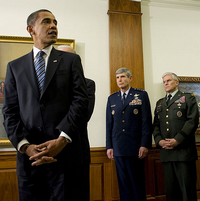Does the United States have a special responsibility to manage international affairs? This question has come to inform much of the debate about the role that the U.S. is currently playing in military operations over Libya. Glenn Greenwald of Salon has argued that the idea that the United States has the right to intervene in the internal politics of other countries has its source in a widespread acceptance of American Exceptionalism, the notion that the United States is different, special and privileged compared to other nations. Writing from a realist perspective, Stephen Walt echoed this claim, arguing that both neoconservatives and liberal interventionists hold exceptionalist views of the U.S. role in the world.
Both Greenwald and Walt suggest that the idea of American Exceptionalism has a destructive effect both on world politics and on U.S. domestic politics, with Greenwald phrasing the question in this way: "Does the U.S. indeed occupy a special place in the world, entitling and even obligating us to undertake actions that no other country is entitled or obligated to undertake? And, if so, what is the source of these entitlements and obligations? Is it merely our superior military power, or is there something else that has vested us with this perch of exceptionalism?"
In fact, the nature of American Exceptionalism depends on the person describing it. Historically, many have used American Exceptionalism to argue against international intervention, colonial adventurism and other such engagements abroad. George Washington's Farewell Address warning against "foreign entanglements" can be read as an exceptionalist case against involvement in European politics, and much anti-colonialist sentiment in 19th-century America had exceptionalist roots. In some sense, therefore, when talking about the impact of exceptionalist ideology, we have to identify which exceptionalism we're examining. Adam Serwer, for example, argues for an "aspirational exceptionalism" that would bring positive U.S. values to the practice of foreign policy.

